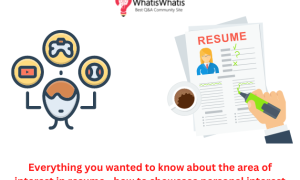Freelance work on a resume refers to any paid work that you have completed on a project-by-project basis, rather than as a traditional employee. Freelance work can be in a variety of industries, including writing, design, consulting, and more.
Including freelance work on your resume can be a great way to showcase your skills and experiences to potential employers. Freelance work can demonstrate your ability to take on projects independently, manage your time effectively, and adapt to different working environments.
Learn: Everything you wanted to know about the area of interest in Resume
Tips For Including Freelance Work on Your Resume
- Determine which freelance work is relevant to the job you are applying for. Focus on showcasing the skills and experiences that are most relevant to the position you are applying for.
- List your freelance work in the “Experience” section of your resume, along with any full-time or part-time positions you have held.
- Use the same format as your other work experiences, including the company name, job title, and dates of employment. If you were self-employed, you can use your own name as the company name.
- Describe your responsibilities and achievements in the same way you would for a full-time or part-time position. Include specific examples of projects you completed and any skills or knowledge you gained during your freelance work.
- If you have worked with multiple clients as a freelancer, consider grouping them together under a general job title such as “Freelance Writer” or “Freelance Graphic Designer.”
- Include any relevant accomplishments or notable projects you completed during your freelance work. This can include any awards or recognition you received, as well as any particularly complex or challenging projects you successfully completed.
- Consider including any relevant coursework or education related to your freelance work. This can help to demonstrate your knowledge and expertise in your field.
By following these tips, you can effectively highlight your freelance work and showcase your skills and experiences to potential employers.
Check now: How to design resume that will get you hired
Freelance Resume Template:
[Your Name]
[Email] | [Phone Number]
[LinkedIn Profile] | [Portfolio or Personal Website]
Summary:
Freelance [Industry] professional with 5+ years of experience providing [services/products] to clients. Skilled in [skills] and experienced in [achievements]. Proficient in [tools and software]. Seeking new opportunities to apply my skills and contribute to the success of a company.
Experience:
Freelance [Industry] Professional | Jan 2018 – Present
- Provided [services/products] to clients in a variety of industries, including [industries].
- Developed and implemented strategies for improving [area of expertise] for clients.
- Collaborated with clients to understand their needs and develop custom solutions.
- Utilized [tools and software] to complete projects efficiently and to a high standard.
Freelance [Industry] Professional | Jan 2016 – Dec 2017
- Provided [services/products] to clients in the [industry] industry.
- Developed and designed [area of expertise] for clients.
- Created and maintained strong relationships with clients through effective communication and timely project completion.
- Utilized [tools and software] to complete projects efficiently and to a high standard.
Education:
[Degree] in [Field] | [University] | [Year]
Skills:
- [Skill 1]
- [Skill 2]
- [Skill 3]
Tools and Software:
- [Tool 1]
- [Tool 2]
- [Tool 3]
Add your Portfolio URL:
If you have a portfolio or personal website, it can be a good idea to include a link to this on your resume. This can help potential employers see examples of your work and learn more about your skills and experiences.
Feedback from Customers
It is also a good idea to include feedback from customers on your resume, as this can help to demonstrate the value of your work and the positive impact you have had on clients.
If you have received any written testimonials or reviews from customers, you can include these in the “Experience” section of your resume, along with a link to the review or testimonial online. This can help to provide additional context and credibility to your work.
Learn more: Impact Hiring: Sustainable Recruitment For Businesses
Skills for Freelancer Resume
There are many skills that are valuable to highlight on a resume for self-employed or freelancers
Entrepreneurial skills:
These may include skills such as innovation, risk-taking, problem-solving, and decision-making.
Time management:
As a self-employed individual, you will likely be responsible for managing your own time and priorities. Showcasing your ability to manage your time effectively can be a valuable asset.
Communication skills:
As a self-employed individual, you may be responsible for communicating with clients and stakeholders. Strong communication skills can help you effectively convey your ideas and build relationships with clients.
Leadership skills:
If you have managed a team or taken on leadership roles during your self-employment, these skills can be valuable to highlight on your resume.
Adaptability:
The ability to adapt to new situations and environments can be valuable for self-employed individuals, as you may be working in a variety of different settings.
Technical skills:
Depending on your industry, you may have specific technical skills that are relevant to your work. Be sure to highlight any relevant technical skills you have on your resume.
Conclusion:
It is important to effectively describe your freelance work on your resume in order to showcase your skills and experiences to potential employers. When describing your freelance work, use the same format as your other work experiences, including the company name, job title, and dates of employment.
Describe your responsibilities and achievements in the same way you would for a full-time or part-time position, using action verbs and bullet points to organize your responsibilities and achievements in a clear and concise way.
FAQ‘s
Yes, you should include freelance work on your resume. It demonstrates your skills and experience in the industry, and can help you stand out from other candidates. Be sure to include details such as the company or organization you worked for, the type of work you did, and any results or accomplishments. This will give employers a better picture of what you are capable of doing.
You should list freelance experience on your resume if it is relevant to the job you are applying for. Include the dates of your freelance work, a brief description of the projects you worked on and any skills you developed during this time. If you have any proof of your work such as client testimonials or awards, include those too. Be sure to emphasize how this experience makes you a better candidate for the position you’re applying for.
You should not list freelance experience on your resume if it is not relevant to the job you are applying for. Additionally, if the freelance experience is from a long time ago and no longer applicable, there is no need to include it. Finally, if you do not have enough space on your resume, it may be best to omit any non-essential freelance experience.






Leave a comment